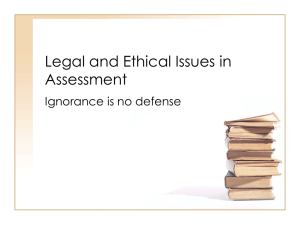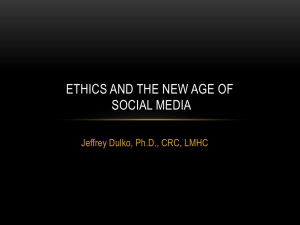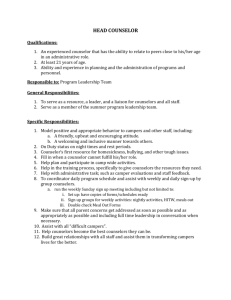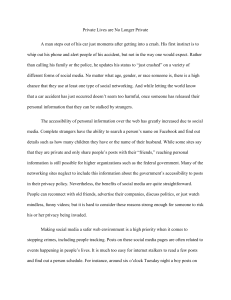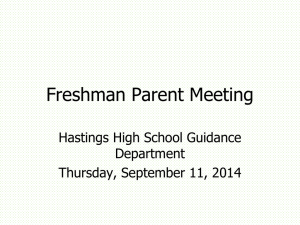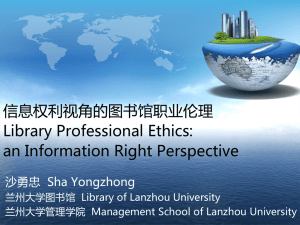Click Here
advertisement
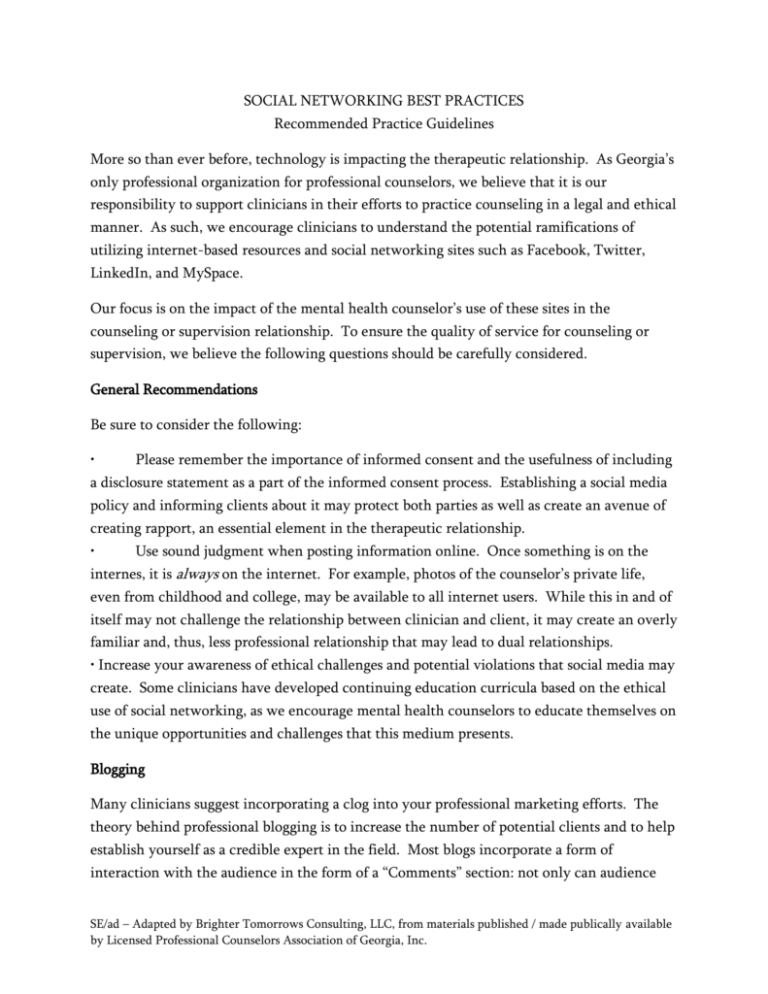
SOCIAL NETWORKING BEST PRACTICES Recommended Practice Guidelines More so than ever before, technology is impacting the therapeutic relationship. As Georgia’s only professional organization for professional counselors, we believe that it is our responsibility to support clinicians in their efforts to practice counseling in a legal and ethical manner. As such, we encourage clinicians to understand the potential ramifications of utilizing internet-based resources and social networking sites such as Facebook, Twitter, LinkedIn, and MySpace. Our focus is on the impact of the mental health counselor’s use of these sites in the counseling or supervision relationship. To ensure the quality of service for counseling or supervision, we believe the following questions should be carefully considered. General Recommendations Be sure to consider the following: • Please remember the importance of informed consent and the usefulness of including a disclosure statement as a part of the informed consent process. Establishing a social media policy and informing clients about it may protect both parties as well as create an avenue of creating rapport, an essential element in the therapeutic relationship. • Use sound judgment when posting information online. Once something is on the internes, it is always on the internet. For example, photos of the counselor’s private life, even from childhood and college, may be available to all internet users. While this in and of itself may not challenge the relationship between clinician and client, it may create an overly familiar and, thus, less professional relationship that may lead to dual relationships. • Increase your awareness of ethical challenges and potential violations that social media may create. Some clinicians have developed continuing education curricula based on the ethical use of social networking, as we encourage mental health counselors to educate themselves on the unique opportunities and challenges that this medium presents. Blogging Many clinicians suggest incorporating a clog into your professional marketing efforts. The theory behind professional blogging is to increase the number of potential clients and to help establish yourself as a credible expert in the field. Most blogs incorporate a form of interaction with the audience in the form of a “Comments” section: not only can audience SE/ad – Adapted by Brighter Tomorrows Consulting, LLC, from materials published / made publically available by Licensed Professional Counselors Association of Georgia, Inc. members comment on the blog article, but they can also comment on previous comments left by other audience members. For best results, we recommend that following: • Maintain a respectful separation of personal blogging and professional blogging. Content of personal blogs may include information about yourself outside of the therapeutic space, your family, your hobbies and interests. Content of professional blogs may include topics such as mental health tips, book reviews/suggestions, information about community resources, etc. If you maintain a personal blog, we encourage you to learn more about privacy settings which may allow you to restrict who sees your blog entries. • Consider the use of the “Comments” feature of your blog. We encourage you to utilize any privacy features that allow you to monitor the publishing of comments. Clients may attempt to interact with you via the comments section, which could challenge privacy as well as confidentiality. Social Networks Social networks are online services used to build and reflect relationships between people, organizations, and activities. Users have a user profile which allows them to connect or link themselves to other profiles, in addition to other services like instant messaging. Opinions, events, activities, etc., are easily disseminated within the network, making it possible for users to quickly share information. Currently, the most popular forms of social networking in the United States are Facebook, LinkedIn, and Twitter, with less-frequently used examples as MySpace, Plaxo, and Friendster. As you consider creating and maintaining social networks, we recommend the following: • Maintain separate personal and professional presences. As stated above, information about the personal life of the counselor may inadvertently interfere with the quality and, thus, the efficacy of the therapeutic relationship. • Familiarize yourself with the privacy settings of each social networking site and utilize them to limit the amount of information available on your personal profiles to those to whom you are not directly connected. Additionally, routinely review and update these privacy settings on personal and professional accounts, as social networking sites reserve the right to alter these settings without informing users. Use of Search Engines SE/ad – Adapted by Brighter Tomorrows Consulting, LLC, from materials published / made publically available by Licensed Professional Counselors Association of Georgia, Inc. The amount of information available on the web is staggering and, oftentimes, incredibly useful to users. However, we caution all clinicians to carefully consider using the internet to seek information about clients without their knowledge or consent. Although we may publish professional information about ourselves and our services for potential customers to review, clients may publish information about themselves that was not meant for the counselor’s eyes. This could be considered a breach of privacy and, thus, and ethical violation. Note to Supervisors If you plan to supervise someone for licensure, it is important to remember that ethical codes urge us to avoid dual or multiple relationships. Although many supervisors and supervisees are able to maintain a professional relationship while developing a personal one, we encourage supervisors to enter into such personal relationships carefully and mindfully. As such, we suggest that social network usage between supervisor and supervisee be limited, purposeful, and mutually constructed. SE/ad – Adapted by Brighter Tomorrows Consulting, LLC, from materials published / made publically available by Licensed Professional Counselors Association of Georgia, Inc.
